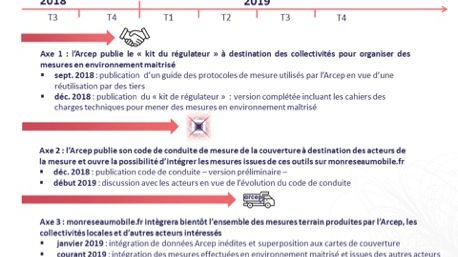Arcep is redesigning the monreseaumobile.fr (my mobile network) website which provides mobile coverage and quality of service maps, to meet the needs of regions wanting to voice their coverage needs, as part of the New Deal for Mobile. In addition to the coverage maps that Arcep publishes, some local elected officials want to take their own measurements, and employ crowdsourcing solutions to that end. To help make this possible, Arcep is giving renewed impetus to its data-driven approach to regulation and its openness to collective intelligence, and today is announcing three new courses of action.
1. A “regulator’s toolkit” is being made available to local authorities, to perform new tests in a controlled environment, to complement those performed by Arcep
In response to the New Deal for Mobile, several local authorities expressed a need for tools for assessing mobile connectivity in specific locations. Which is why, in September 2018, Arcep published a teaching guide to the protocols it employs for its field measurement campaigns. Today, this guide is being supplemented by technical specification models, which can simply be reused for selecting a service provider to perform a field measurement campaign. This “regulator’s toolkit” is aimed at local authorities, and any other stakeholder wanting to perform comparable tests to satisfy their own needs, e.g. in as yet unexplored geographical areas. It will enable tests to be carried out in a controlled environment, thereby separating out the many outside factors that can influence the results, and distort their relevance, such as the type of mobile phone used, time of day or whether the test is performed outdoors or indoors.
By making it easy to reuse these protocols, and making them more understandable, Arcep is hoping to encourage initiatives designed to complete its own set of actions. Arcep therefore invites all interested parties to adopt its “regulator’s toolkit”: the shared use of these tools will lead to a more detailed and accurate dialogue, based on a robust methodology and comparable measurements.
2. A “Code of conduct” for stakeholders involved in testing
A number of players are offering applications for measuring the mobile user’s experience, such as crowdsourced speed tests that anyone can perform on their phone. These solutions create the ability to obtain millions of measurements across the country.
Today, Arcep is publishing a preliminary version of a “Code of conduct” whose aim is to ensure a minimum level of requirement in terms of the relevance, presentation and transparency of the measurements. The purpose is to propose a co-construction approach, and so ensure that the supplementary measurements being taken can indeed serve to enhance Arcep’s publications, keeping in mind that Arcep already publishes information to meet the responsibilities assigned to it by Law. For measurement tools (such as crowdsourcing apps) to be recognised by Arcep, they will need to adhere to a code of conduct. Arcep will consult with stakeholders to fine tune this Code of conduct, so that those who adhere to it can make themselves known quickly to local authorities. For Arcep, the goal is to help local authorities looking for the right tools to obtain measurements that will augment existing coverage maps. The data collected through these tests could also be published on the monreseaumobile.fr website
3. Monreseaumobile.fr will soon incorporate all of the field measurements produced by Arcep, local authorities and other interested parties
The monreseaumobile.fr website currently allows users to have a visual snapshot of operators’ coverage maps, and of the quality of the services provided on (rail and road) transport corridors.
In early 2019, new additional Arcep data will be superimposed on the coverage maps, to deliver a more detailed view of mobile users’ quality of experience (QoE), and serve to flesh out the measurements already on display. Users will therefore be able to superimpose operators’ maps with the millions of annual measurements that Arcep has already taken, to check operators’ coverage, but also the entire findings of Arcep’s quality of service (QoS) testing campaigns conducted in both housing areas and transport corridors. Over time, Arcep will incorporate the results obtained by third parties that comply with the protocols in the regulator’s toolkit and the Code of conduct, and who want to enhance monreseaumobile.fr and complete the actions taken by Arcep.
All of the data produced by Arcep and available on monreseaumobile.fr are also available as open data. Arcep is currently working to create a mobile data warehouse, to make it even easier for third parties to use this information.
Arcep invites local authorities, app designers, consumer associations and citizens to take part, and to complete and feed monreseaumobile.fr additional data so that, together, we can make it the platform of reference for obtaining information on mobile connectivity in France.
monreseaumobile.fr redesign schedule

